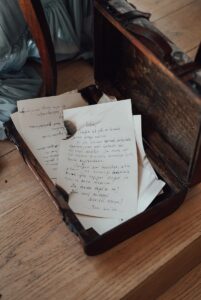Fanny, from her childhood, loved to write poems. Poems were where she escaped from a world she found overwhelming and challenging, even in the best of times. Fanny was very shy. She was nearsighted and her family lacked resources to provide her with glasses. Uncomfortable around others, she would escape to her room and her bed where, pencil and paper in hand, she would write poems–poem upon poem upon poem. One night, when her father came to tuck her in for the night, he noticed a fairly large “lump” under her covers. Asking Fanny what it was he found a very large stack of poems–all written in the tentative hand of a shy little girl with a tremendous talent.
Her father didn’t chastise her for writing when she should have been sleeping. Nor did he suggest she might want to focus on other things that could be more productive. (Most of us don’t know many successful poets who don’t struggle to provide for themselves). Instead, he put her to bed and went to work himself.
He built a wooden box, large enough to accommodate the large and growing pile of poems. At the top of the box, he cut a slot. When he presented the box to Fanny, he told her that each night, when she finished writing a poem, she should place it through the slot in the box. The next day, over dinner, he and the family would read her poem out loud and then give her gentle and loving input on how to improve it. Knowing that her family loved her, despite her timidity and shyness, Fanny consented to the plan.
Many nights Fanny would, just before going to sleep, slip her newest poem through the slot in the box. The next day, as the family gathered for dinner, the box opened, the poem shared and suggestions lovingly made.
Because of this childhood experience, Fanny kept writing poems. By age 25, she was famous throughout the British Empire. Before her death in 1895, they would publish nearly 400 poems to critical and consumer acclaim. Fanny gathered many of the poems into a book of Children’s Songs called “Hymns for Little Children” which, in the Christian world, has become part of the worship service of many congregations around the globe.
Fanny’s determination to write, despite her challenges and her father and family’s loving commitment to work with her – out of respect and sensitivity but with a commitment to help her improve–created a family environment where one member’s talents became part of a family committed to “work with” every single child to help them do what they were so passionate to do.
When we “work with” others, whether they are child poets or highly talented team members, we create a culture where talents flourish, solutions surface and goals met and exceeded, often at levels we could not have initially imagined.
Story taken from “@BaylorDigitalCollections”–Cecile Frances “Fanny” Alexander



